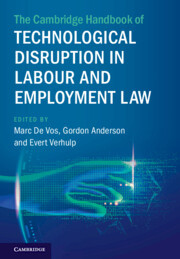Description
The Cambridge Handbook of Technological Disruption in Labour and Employment Law
Cambridge Law Handbooks Series
Coordinators: De Vos Marc, Anderson Gordon, Verhulp Evert
Language: English
Subject for The Cambridge Handbook of Technological Disruption in...:
Publication date: 12-2023
450 p. · Hardback
450 p. · Hardback
Description
/li>Contents
/li>Biography
/li>
Whether through gig work, remote work, or platforms such as Uber, new technologies are reshaping the very fabric of employment relations. This handbook offers a comprehensive, international overview of how institutions, countries, and legal systems are responding to the technological disruption of the work world. Chapters outline the reform agendas driven by the International Labour Organization and the European Union and detail the public policy debates, litigation, and legal reforms that technological innovation has triggered around the world. This volume provides a post-pandemic assessment of how digitalization is affecting employment and employment relations and contextualizes current technological disruption with a long-term view of how labour and employment law could evolve further.
1. Technology and Law for the Future of Work We Want Marc De Vos; 2. The International Labour Organization and the Future of Work Valerio De Stefano and Mathias Wouters; 3. The Digitalisation of Work and the EU: Jurisprudential and Regulatory Responses in the Labour and Social Field Despoina Georgiou and Catherine Barnard; 4. The Impact of Technological Disruption on German Labour Law: Risks and Opportunities Claudia Schubert and Patrick Rieger; 5. Austria: The Corporatist Perspective on Technological Disruption Franz Marhold and Peter C. Schöffmann; 6. Technological Disruption in Employment and Labour Law in the Netherlands Evert Verhulp; 7. The Digitalisation of Labour Law in France Sophie Robin-Olivier; 8. Italian Labour Law: Trends and Developments Put to the Test of Technological Disruption Emanuele Dagnino and Michele Tiraboschi; 9. Spain: Towards a New Architecture for Labour Law Institutions Daniel Pérez del Prado; 10. Technological Developments and Industrial Relations in Denmark Natalie Videbæk Munkholm; 11. Poland: Old and New Legal Concepts in the Changing World of Work Leszek Mitrus; 12. Technological Disruption and the Evolution of Labour Law in Hungary József Hajdú; 13. Digitalisation and Disruption of Labour Relations in Estonia Gaabriel Tavits; 14. Israel: New Trends in Israeli Labor and Employment Law Lilach Lurie; 15. United Kingdom Labour Law and Technological Authoritarianism at Work: Past, Present and Future Ioannis Katsaroumpas; 16. Old Problems and New Technologies in the American Workplace Jeffrey M. Hirsch; 17. Australia: Reimagining the Regulation of Work Sarina Troy; 18. Technological Disruption and the Future of Work in Aotearoa/New Zealand Gordon Anderson; 19. Technological Disruptions in Labour and Employment Law: South Africa Debbie Collier and Lindani Mkhwanazi; 20. Japan: Labour Law and Policy in an Era of Technological Innovation Ryuichi Yamakawa; 21. The Republic of Korea: Old Regulations and New Challenges in the World of Work Keunju Kim and June Namgoong; 22 Technological Disruption and Labour Law: Between Utopia and Dystopia Marc De Vos.
Marc De Vos is a professor at the University of Ghent Faculty of Law and Criminology, author and strategy consultant with executive experience in academia, professional services, and policy think-tanks, in Europe and Australia. His areas of expertise, about which he has published, lectured and advised widely, are the labour market and HR, the welfare state, globalization, and the European Union.
Gordon Anderson is Emeritus Professor of Law at Victoria University of Wellington. He has published widely on the evolution of New Zealand labour law since the neoliberal revolution of the 1990s and is currently Vice-President for Asia of the ISL&SSL. He has provided legal advice to unions and governments on law reform.
Evert Verhulp is professor of Labour Law at the University of Amsterdam. Until 2022, he was independend (appointed by Crown) member of the Social Economic Council and he was member of the advisory committee on the reform of the labour market. He publishes on the selfemployement, platformlabour and fundamental rights.
Gordon Anderson is Emeritus Professor of Law at Victoria University of Wellington. He has published widely on the evolution of New Zealand labour law since the neoliberal revolution of the 1990s and is currently Vice-President for Asia of the ISL&SSL. He has provided legal advice to unions and governments on law reform.
Evert Verhulp is professor of Labour Law at the University of Amsterdam. Until 2022, he was independend (appointed by Crown) member of the Social Economic Council and he was member of the advisory committee on the reform of the labour market. He publishes on the selfemployement, platformlabour and fundamental rights.
© 2024 LAVOISIER S.A.S.




